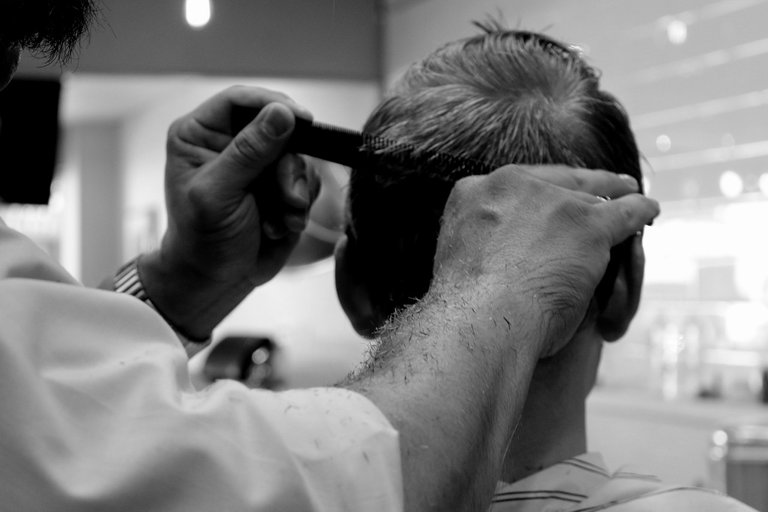
Economists from the University of Minnesota and Princeton University, have previously estimated that occupational licensing schemes around the United States are keeping more than 2.8 million jobs out of the market.
These days if you want to do something like braid hair, be a tour guide, organize flowers, make drinks, or do someone's makeup, you're going to need to first weave yourself through the regulatory web that's in place; before you can voluntarily serve your fellow man.
And what has all of the licensing achieved?...
Economists admit that with these intense occupational licensing schemes, that consumers are being forced to pay more, but the service isn't improving.

In some cases, various lawsuits have been launched to try and challenge these licensing schemes and a few of them have been able to achieve some success.
Florida happens to have some of the worst occupational licensing restrictions in the country, but they've recently announced that they will be fast-tracking some reforms.
The bill will be looking to lower the training hours that are required before getting licensed, as well as making exempt some of the specific skills that are now required before someone can serve in a certain industry in the market. Though it might be a slight step in the right direction, it still isn't enough.
When it comes to which state is the worst in the way of their licensing rules, Florida ranks in 5th place according to the Institute for Justice which tracks licensing requirements around the country.
These occupational licensing laws are a problem because they are preventing millions of people from finding work, or perhaps doing something they'd prefer to do or are naturally skilled at doing. And if someone out there is a great hair-braider, bartender, or manicurist, it seems uncivilized to prevent other people from making willing, voluntary exchanges with them doesn't it?
In the end, it isn't the people who these rules are helping, because they aren't promoting safety. They are helping to keep prices high, quality low, and keep many people living a lower standard of living than they could otherwise live, if they were allowed to make a voluntary exchange with those around them who were willing. Things would be much better off if they didn't first need to seek permission from the state before trying to serve others who were willing to accept their services.
Pics:
Pixabay
Sources:
https://www.investors.com/politics/commentary/a-government-permission-slip-to-work/
http://reason.com/blog/2018/01/16/florida-house-passes-licensing-reforms
http://ij.org/press-release/florida-house-passes-bill-reform-repeal-dozen-job-licenses-2/
http://orlando-politics.com/2018/01/12/week-ethics-transparency-16-bills-house-passed-week/
http://dailysignal.com/2018/01/19/will-florida-lead-the-way-in-job-creation-through-occupational-licensing-reform/
http://ij.org/press-release/new-website-shows-human-cost-occupational-licensing-laws/
Related Posts:
Authorities In Florida Threaten Health Blogger With Jail Time And Fines
City Sued Over Tour Guide Licensure Racket
https://steemit.com/freedom/@doitvoluntarily/city-sued-over-tour-guide-licensure-racket
The Freedom To Sell Baked Goods From Your Own Home
https://steemit.com/food/@doitvoluntarily/the-freedom-to-sell-baked-goods-from-your-own-home
Just another excuse to extort money from the populace. It doesn't increase safety or provide better services but creates the illusion of safety at additional cost. Consumers are the best licensers, they will promote those who provide good products and services and shun those who don't. Simple and efficient but deadly to governments.

thanks for sharing such valuable information. Pointless titles and regulations that we have self-imposed as the people. Laws that protect nothing and no one.
Sad fact : it requires more hours (nationwide) to be a hairdresser than a police officer
We deal these liceneing schemes here in Canada as well ! i think its totally rediculous , the service isnt any better i find , its just another monopoly type of cash grab costing the consumers more money usually as well ! look at me , i need to pay $69.00 dollars every year just to renew my security license ! and i do all the work by filling out the paper on line and sending it in ! then they send me a new picture I D saying the dates im licensed for , just like a drivers license , but at least with that its every 5 years and not a yearly expense !! So for a piece of plastic I pay 69.00 dollars every year for !! ITS TOTAL BS !!Thanks for sharing @doitvoluntarily , upped and resteemed !👍😀👍👍👍

The public likes to think of licensing as a way of being sure that the person they hire is competent. Unfortunately, any idiot can get through the testing process.
So, you can have an electrician that doesn't know what he is doing, or cuts corners, and just because he has a license, doesn't insure anything.
Take a person who is good at massage. Everyone they touch loves it. But, that person cannot sell their talents. But, a meat fisted, clumsy, not at all empathic, bafoon can spend the money and get 500 hours of overseen massage time and get a license.
But, to be fair, how does a bureaucrat tell the difference between a person who is excellent in the field, and one that is mediocre? They can't. If they had any of the skills that the license, they would be doing something that paid a lot more.
So, it is all a farce. Just a show that the govern-cement is doing something. (while making stealing some more money)
Very true.
My grandmother was a Floridian and a widow who supported two children on a barber's income, cutting hair in her own home. This way, she kept her business overhead low and was able to be home for her kids while earning money. Nowadays, a single mother would have to take out a loan just to get the education required to cut hair. And then she can forget about setting up a business in her own home. Occupational licensing makes entrepreneurship an extremely difficult proposition for people in the lower economic strata.
And it's all due to economic collusion. If you want to ensure that you and your cronies will never have to worry about competition from cleverer, nimbler entrants into your market, there's only one thing to do: demand that the government license your trade or profession.
Even the IT industry has so many certifications and lots of people of have the certifications cannot do the job.
It seems like the government wants to make profit from anything possible . It’s scary to even think that people can not make a living to feed their family anymore because of these kinds things .
A lot of these licenses do not cost much - I cannot believe the govt is making a huge profit on them. Much more likely it is costing the govts money.
I believe it is out and out protectionism. It should end immediately.
Glad to hear Florida is starting - but please move further and faster !!!!!
So sad
It's not nearly enough, but it's a start. We will break free of this over lording system.
I think this is a problem of almost everyone, here in Argentina the costs are increasing and not necessarily improve the service, quite the contrary, there is a reduction in service and increase in cost.
excellent material dear friend / @ doitvoluntarily thank you very much for making us arrive
I wish you a great day
It’s exactly the same as if you were a contractor. In NY not only you need Home Improvement License, but you also need EPA (useless) OSHA (useless), three types of insurances...
I had to get all of it.
A friend of mine grew a big business.
When I asked him what the most valuable part of his business was - he said Government licenses. Mostly from the EPA is his case.
There is something seriously wrong when government licenses are the most valuable part of your business.
Why can't they just create a unified licence with all the requirements, instead of too many unnecessary ones, i get your frustration as it is the same where i am
And you have to renew it every few years. Its just another way to get the money from you.
It's a wonder people even bother starting a business! Then they want to tax your earnings too. Messed up.
I almost forgot! The Alabama Senate passed a bill that eliminates marriage licenses. (So they say) I was excited when I first read the headline. All it really does is eliminate the requirement of a ceremony to solemnize the marriage. The cost would be the same that it now costs to buy a marriage license.
So.......not much changed freedom wise. It just takes the discretion away from probate judges and allows you submit an affidavit for marriage.
Here is the link if you want to read it.
http://www.al.com/news/index.ssf/2018/01/alabama_senate_passes_bill_to_7.html
Thank you for bringing this subject. I was not aware of this type of restrictions in the USA. Obviously I'm not from there. Here, in most Latin American countries there are no such restrictions for such simple professions but that so necessary for day to day in our life. Of course, the fact of having a weak regulation can also give way to services of very poor quality. Definitely the two extremes are bad and hopefully in your country it will be possible to flex the issue of licenses for some jobs...Greetings.
Its just not right, the government wants to keep the man down
good post.
A very interesting article on self-employment permissions. Thanks for sharing @doitvoluntarily.
For many decades, the United States occupy a leading place among the countries of the capitalist world-of-sales licensed trade, however between 1960 and 1989, their share decreased from 38.6% and 27.9%. This is mainly due to the reduction in share of dollars in export licenses from 70,8 to 47.0%. In these years, the most rapidly growing export and import licenses in the countries of Western Europe, which ensured them supremacy in the trafficking, import, and since 1989 in export licenses, among other centers of international trade licenses. However, the American firm firmly hold the leading position in the export licenses compared to companies of other countries of the capitalist world. The leading role of the United States export licenses is not only a huge scientific and technical potential of the country, but by us transnational corporations active policy of economic expansion through joint export of capital and the sale of licenses. The analysis of directions of this policy shows that weakening its activities in trade license independent firms, American corporations at the same time strengthen the position in the licensed trade between U.S. parent companies and their numerous branches and subsidiaries abroad. This ensures monopolies significantly higher profit and strong position in foreign markets.
In the import licences over the past 50 years the U.S. share has increased significantly. This suggests that the US significantly changed its policy in respect of procurement of foreign technology and rapidly increased their volumes in the late 80-ies. According to this indicator, in 1989 the USA was among the leading countries-importers license, significantly trailing only Japan.
In the years 1960-1989 the most dynamic center of world capitalist trade licenses remained the industrialized countries of Western Europe. In 1989, the turnover of the licensed trade subsequent places after the United States (14060 $ mil.) and Japan (7340 $ mil.) occupied (million us$): UK – 4333, Italy – 4134, Germany – 4050, France – 3021, nl – 2390, Belgium and Luxembourg – 1869, Sweden – 1041.
A significant increase of public funds and expenditure of private firms on R & d and increasing investment of capital abroad has allowed the leading Western European countries to achieve high efficiency in the use abroad of scientific and technical capacity through the sale of licenses. The development of the processes of specialization in scientific research and cooperation in industrial application of its findings contributed to the growth of the licensed trade mainly between the countries of the region, as well as the United States and Japan. After the United States, Western European countries occupy leading positions on the size of the proceeds from the sale of licenses. In 1989, these revenues amounted to ($mil.): UK – 2205 (8.8 per cent), Italy – 1619 (6,4%), Germany – 1360 (5,4%), France – 1146 (4.6%), Netherlands – 773 (3,1%), Belgium and Luxembourg – 705 (2.8 percent).
Due to the high pace of development of the licensed trade in the countries of Western Europe over a 30-year period have increased significantly their share in world licensing exchange: turnover from 34.4 to 49%, exports from 28.6 to 42.3%, import from 40 to 55.6%. In terms of turnover, export and import licenses, the region ranks first in the capitalist market licenses.
One of the important centers of capitalist trade license is Japan. Along with Germany the country throughout the postwar period a leading position in the capitalist world for import licenses. In the years 1960-1989 Japan increased purchases of licenses to more than 56 times. Acquired license from the Japanese company are used not only for upgrading the leading sectors of its economy, but also as a potential for the development of private scientific and technological research. The increase in spending on research and development and revision of the acquired licenses development allowed Japan to early 80-ies. significantly increase export licenses. Significantly lagged in the 70s from the US and the leading countries of Western Europe in terms of sales licenses in Japan in 1989 came in third place on this indicator.
The most numerous group in the capitalist sector of the licensed trade are developing countries in Asia, Africa and Latin America. An important criterion for their Association in the field of the licensed trade are not geographic, and economic characteristics. These countries are characterized by a relatively low level of development of national economic and scientific-technical potential of significantly restricting not only the sale but also the purchase and the possibility of using foreign licenses. The weight of these countries in the export license in 1989 was 1.4% and only in two times increased compared to 1970.
In international statistics there was no evidence that the size of the production and trade of goods manufactured under license, with the exception only of individual-level information about the production license of some products.
Produced on the basis of statistical data on the payments for the license usage estimates show that in 1989, the capitalist world under license were produced products worth more than $ 500 billion.
For the characteristics of the world market licenses of great interest is its sectoral structure. The formation of industrial markets is determined by development trends and structural changes in the global economy, specialization of production and the concentration of R & d and inventive activities in knowledge-intensive industries, producing goods with high consumer properties. The relationship of volumes and directions of investments in R & d status and directions of development of markets of licenses one can trace by analysing the available statistical data, although the impact of R & d in the licensed trade is manifested, as a rule, not immediately, but after a period (3-5 years) required for the development and use of inventions by its owners, to market and introduction of new technologies, the buyer licenses.
For the world market characterized by the predominant development of the licensed trade in the electrical and electronic industry, General machine building, instrument making, automotive, aerospace industry, chemistry and petrochemistry, biotechnology, in the field of resource-saving technologies etc. In 70-80th years has been the rapid development of commercial exchange of inventions in the field of the environment. Active process of saturation of scientific and technological achievements of the progressive industries has a direct impact on the market of licenses, strengthening its material base, significantly accelerates the growth rate of the licensed trade and leads to intensive formation of international industrial markets licenses. In the late 80-ies of the share of private sector markets licenses accounted for: electrical and electronic engineering – 19%, General engineering – 18.8 per cent, chemicals and petrochemicals and 17.4%, transportation equipment – 10,2%, textile and food industry – 6,2% of the total commercial transactions on the global market licenses. Slower pace is the development of international trade licenses in metallurgy, metal working, construction, agricultural, manufacturing, shipbuilding and other traditional industries.